This article contains a brief mention of suicide, there is a warning in the section in question.
For a series that technically falls under the category of science-fiction, Doctor Who certainly has a long history of absolutely nailing it when it comes to horror-centric episodes or even episodes that simply have elements of horror, from the first reveal of the Daleks to much of the Fourth Doctor’s run having tones of gothic horror all the way to modern-day episodes like “The Empty Child” and “Blink.”
“The Waters of Mars,” coming at the end of the Tenth Doctor’s time on Doctor Who, is often regarded as one of the most terrifying episodes, taking the classic “base under siege” type story and turning it into a uniquely harrowing experience. Let’s dive in.
“The Waters of Mars” finds us, believe it or not, on Mars in the year 2059. The Doctor has stumbled onto a human base on the planet’s surface, and after being apprehended by the astronauts there realizes where he is: Bowie Base One, the first human colony on Mars, and that the person in charge is the legendary Captain Adelaide Brooke, who would go on to inspire her granddaughter and other future descendants to lead space exploration for generations.
As he goes through the names of everyone involved, we see brief flashes of Wikipediaesque articles about each one—with a sense of dread slowly building as we see each of them has a date of death in 2059. It turns out, for an unknown reason, Adelaide had triggered the base’s self-destruct sequence on November 21st, 2059—the exact day that The Doctor showed up. What’s more, this day happens to be a “fixed point in time,” a moment that cannot be changed and has to go exactly as it does to ensure the future plays out the way it needs to—basically, Doctor Who’s way of explaining why horrible things happen even when there’s someone who could act to prevent them, and one of the few hard rules in a show that is constantly reinventing itself and breaking its own rules.
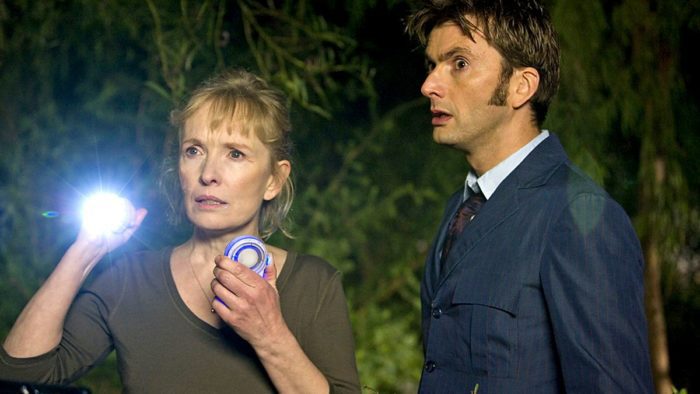
So, when an ominous sound comes through the intercom and the cameras to the biodome suddenly go out, The Doctor immediately realizes it’s time for him to leave. But Adelaide demands that he stay with them, given that whatever is happening didn’t start until he showed up. Once they arrive in the biodome, they come face to face with the monster of the episode: The Flood.
The Flood, as they come to be called, is one of the most terrifying monsters ever seen in Doctor Who, both visually and conceptually. Visually, all we see of The Flood is the impact on the human bodies they possess, leaving them with cracked, dehydrated skin on their faces and spewing water from their mouths. Conceptually, it’s a monster that doesn’t just take the form of water, but the nature of water as well. It’s a patient, relentless force of nature willing to wait as long as it needs to accomplish its goal of reaching Earth and all the water that is waiting there. As The Doctor puts it, water always wins. After three of the crew members wind up becoming infected by The Flood, Adelaide makes the decision that the base has to be abandoned.
But as it turns out, Adelaide is no fool. For most of the episode, Ten has been…off, in an unfamiliar, uncomfortable position of indecisiveness over whether to help or to walk away. Adelaide might have never met him before, but she’s smart enough to know that The Doctor knows something he’s not letting on. She can tell he’s not a coward, and yet all he’s wanted to do from the moment he found out who they were he’s wanted to leave. So when she seemingly lets him go, she first traps him in the airlock and demands that he tell her the truth.
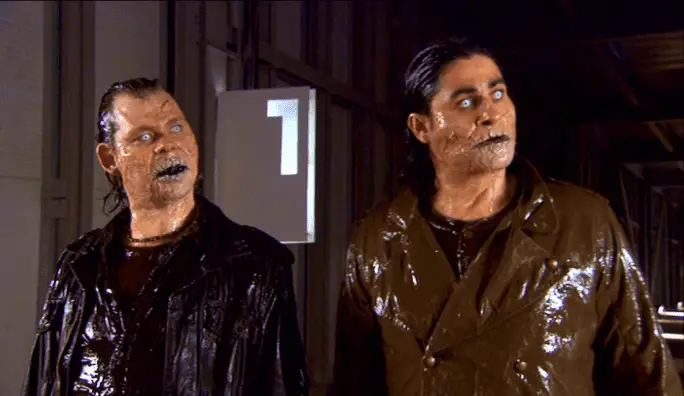
Under duress, The Doctor finally tells her what he’s been keeping to himself: that this is the day when she and everyone else on the base dies, and that her death is what leads the human race to explore the furthest corners of the universe. It’s an event that needs to happen, and as much as he wants to save them, it’s something that he just can’t do, and with one last “Damn you…” Adelaide opens the airlock and lets him leave.
But, it turns out that everything happening up until now has just been setting us up for the true horror of “The Waters of Mars”—but before we get to that, we need a bit of a history lesson, both of where the episode falls in Doctor Who’s run and in who the Tenth Doctor is. I’ll keep it as brief as I can, but everything here is important to understanding “The Waters of Mars.”
There’s a popular fan theory out there that I happen to subscribe to—nothing officially confirmed, but something that makes almost perfect sense when you look at how The Doctor has changed from regeneration to regeneration. In a nutshell, the theory holds that each regeneration—the process by which The Doctor effectively transforms into a new version of himself when he would otherwise die—brings with it an element of evolution, adapting to the weaknesses of his previous self and who he wants to be going forward.
When Doctor Who first returned to television, the Tardis was helmed by the tragically underrated Ninth Doctor, a Doctor unlike any we had ever seen before. He was abrasive, unfriendly, angry—and afraid, not only of something he had lived through but of himself and what he now knew himself to be capable of. Through him, we learned about the Time War: a war between the Time Lords and longtime series monster The Daleks, one that ended with the destruction of Gallifrey and the seeming extermination of both the Time Lord and Dalek races—and one that The Doctor himself had singlehandedly ended.
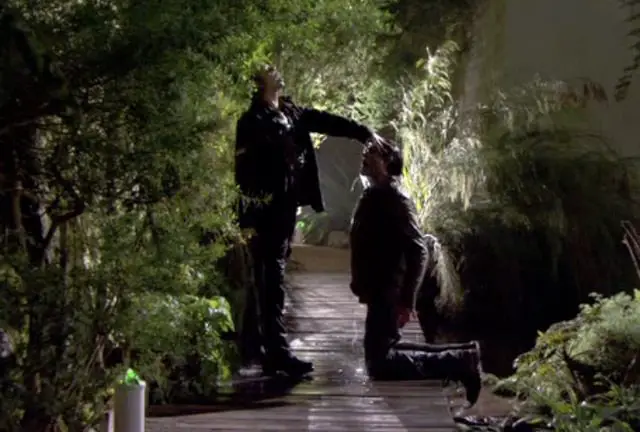
So when we move from the Ninth Doctor to the Tenth, the change is one marked by, of all things, love. First companion Rose Tyler had come to love The Doctor so much that she absorbed the energy from the Time Vortex in order to return to where he was and save him, becoming the entity known as Bad Wolf. And The Doctor loved her so much in turn that he took that energy out of her even though he knew it would be the end of his current form.
Keeping this in mind, it’s not surprising that the Tenth Doctor would mark the start of what some informally call the “Boyfriend Doctor” era, with a Doctor who was almost more of an Austen/Bronte style romantic, tragic hero. All of the Doctor/Companion relationships from this era are defined by love: the love between him and Rose that wound up being so great he would split himself in two to give her the happy ending he never could; the love Martha felt for him, one that he could never return, and one that she would have to grow out of and subsequently leave the Tardis behind of her own volition; the love of two friends that he shared with Donna, one that would lead to each of them risking their lives for the other.
It was also an era marked by unfathomable loss. Rose Tyler wound up trapped in another dimension where he could never see her again. He found another survivor of the Time War—longtime nemesis The Master—only for that survivor to die and once again leave him as the last of the Time Lords. Donna had to have all her memories of their time together burned out of her head in order to save her mind from collapsing beneath all the knowledge of the Time Lords. And hanging over all of that was the Time War and the loss of his home planet and people, Nine’s fear and rage turning into overwhelming loneliness and grief. All of this adds up to a Doctor who feels more human than almost all of his other incarnations, while still feeling like a virtually immortal, often inscrutable alien being—and the sort of Doctor who absolutely should not be traveling without a companion to keep his worst impulses in check, which is exactly where we find him in “The Waters of Mars.”
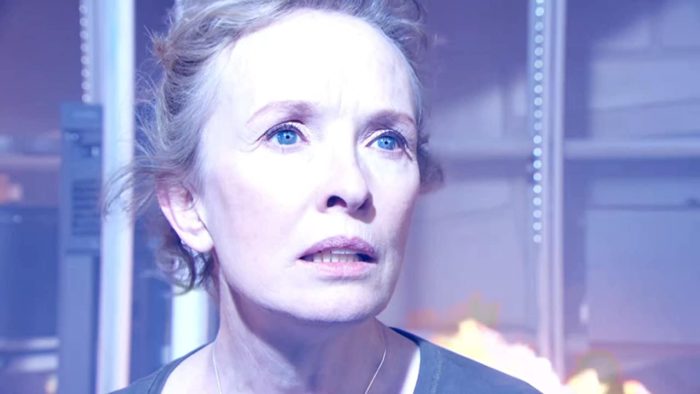
“The Waters of Mars” is one of four specials that aired at the end of the tenures of both David Tennant as The Doctor and Russell T. Davies as the showrunner, serving as a transitionary period while things happened behind the scenes for the handoff to both a new Doctor and an almost entirely new show-running team. Notably, these four specials all served as solo adventures for Ten, with no consistent companion and instead having a different cast of characters for each one. Each one serves as a free-standing story, but in previous special “Planet of the Dead,” a clairvoyant had warned the Tenth Doctor that he was very soon going to die, a prediction that would weigh heavily on his mind for the remaining specials—although as he would later tell Wilfred Mott, he had become attached to this current version of himself and was viewing regeneration as him dying and “some new man walking away.”
It’s with all of this in mind, then, that audiences first watched The Tenth Doctor on that long walk back to the Tardis. We hear the remaining survivors fall to The Flood one by one, cutting back and forth between them and Ten. We feel, along with Ten, the weight of all that loss and grief and death, overwhelmed by the helplessness of knowing that this is a situation where he absolutely cannot help as much as he absolutely wants to—and the helplessness of the seeming inevitability of his coming “death.”
Then…the thoughts start coming. The voice inside starts running wild. “…I’m the last of the Time Lords,” we repeatedly hear, along with other lines from episodes about the Time Lords, the Time War, and how The Doctor is the only one left.
And, with just about ten minutes left in the episode, the Tenth Doctor…snaps.
He returns to the base and immediately starts taking charge of the situation, as we’ve seen him do time and time again. But there’s something different this time, an unfamiliar, unnerving frantic energy in how The Doctor moves throughout the room from console to console. He electrocutes one of The Flood infected victims with an almost gleeful smile on his face, and when he opens his mouth and lets us know what’s going through his mind, what he reveals to us about his thought process is frightening: if the Time Lords were the ones who enforced the laws of time and he’s the only one left, what’s to stop him from changing a fixed point in time? Why shouldn’t he save who he wants, when he wants? Why shouldn’t he change history as he sees fit?
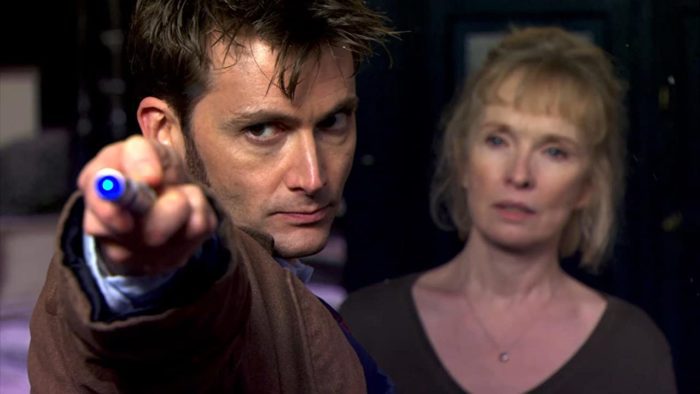
“The laws of time are mine, and they will obey me!” he shouts, at the end of a rant about how the Time Lords all died and he was left alone. When Adelaide activates the Fifth Protocol that will result in the destruction of the base, Ten warns her that “if I have to fight you too, I will.” And most telling of all: “we’re not just fighting The Flood, we’re fighting time itself, and I’m gonna win!!!”
The Tenth Doctor had had more than his fair share of moments of darkness, glimpses of his cold, inhuman, often unfathomable true nature, but what we see here is something else entirely. This isn’t about saving the astronauts on the base, it’s about winning. About seizing control over the course of human history, and of time itself. It’s a nine hundred-year-old alien having a temper tantrum about everything—his upcoming death, the companions he’s lost, the Time Lords being wiped out. It’s petulant, selfish, and wrong—and in these final moments, the Tenth Doctor is effectively turned into a monster, and he needs to be stopped. But it’s too late, and The Doctor successfully manages to get the last three survivors back to Earth right before the base detonates.
But when we finally get back to Earth, there’s none of the joy that normally comes at the end of one of The Doctor’s adventures. Mia is in a state of shock, stumbling out of the Tardis and looking at The Doctor in fear, asking “who the hell are you?” before running off. Yuri goes after her, with Adelaide telling him to look after her. Finally, it’s just The Doctor and Adelaide.
The closing moments of “The Waters of Mars” are one of the tensest endings in Doctor Who’s history. Ten is practically unrecognizable, reveling in his seeming triumph over the laws of space and time and declaring himself “The Time Lord Victorious.” But Adelaide isn’t having any of it and stands her ground against him. She tells him in no uncertain terms that no one should have that sort of power, nor should anyone be at a level where they can decide who’s important and who isn’t. When he opens her door and tells her to go home, she asks “Is there nothing you can’t do?” To which he gives the chilling response: “Not anymore.”
But Adelaide has other things in mind—trigger warning for this paragraph, just in case. Turns out, she took to heart what The Doctor had told her about her importance in the course of human history. As she closes the door to her house we see her take her service weapon from its holster, and when the door closes we hear the weapon go off. The sound feels massive, and as we zoom into The Doctor’s face we get another flash to the Wikipedia-looking articles from before: all that’s changed is that Captain Adelaide Brooke died on Earth and that the other two survivors told the story of her heroism on the base.
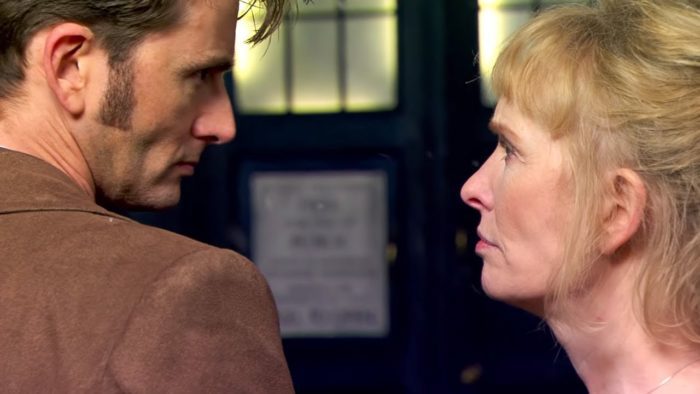
In the end, history remains relatively unchanged, and instead of saving Adelaide, the two survivors wind up being people who The Time Lord Victorious would have deemed “unimportant.” In an instance, we can see The Doctor process what he’s done—one of many moments that speaks to David Tennant’s skill as an actor, as he goes from triumph to defeat to shock. “I’ve gone too far…” he whispers to himself before he sees an apparition of Ood Sigma that he interprets as a sign of his imminent death before running back into the Tardis.
What sets “The Water of Mars” apart from other horror-themed episodes is the source of its terror. While The Flood is certainly a terrifying monster, it ultimately pales in comparison to those final ten minutes, of that sight of a terrifying, off the rails Doctor who is absolutely in the wrong. It’s almost like an episode of What If? showing us a glimpse of an alternate reality of a Doctor who was more willing to break the rules and try to seize control of space and time.
It’s also a remarkably bold direction for Davies, Tennant, and company to take for the next-to-last adventure of the Tenth Doctor, giving us a glimpse of Ten as we’ve never seen him before: indecisive and scared, before going off the rails and turning borderline megalomaniacal. Suggesting that maybe there shouldn’t be a mercurial, temperamental being going through space and time to potentially intervene at crucial moments in history, no matter how much we might trust him. It’s something that would get lost as the show progressed over time, but for a brief moment, we got a horrifying glimpse of what would happen if The Doctor went off the rails and a uniquely terrifying episode in Doctor Who’s long run.
Looking for more horror TV episode spotlights? We’ve got you:
“The Monsters Are Due on Maple Street: The Scariest Episode of TV I’ve Ever Seen”



